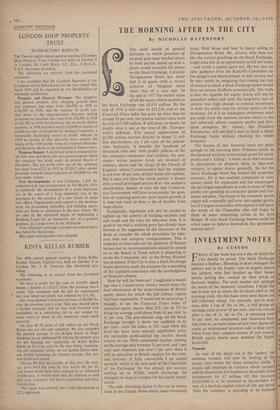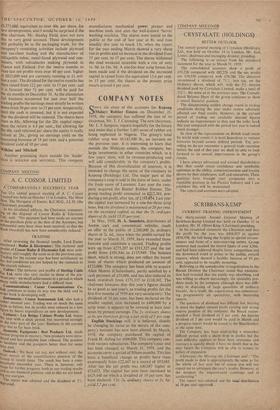INVESTMENT NOTES
By CUSTOS UaiDAY of last week was not a day of which the r City should be proud. The Stock Exchange became a bedlam. Shouting brokers besieged the jobbers and in the frantic rush to acquire shares the jobbers, who had levelled up their books before polling day, cocked up their prices to fantastic heights. The steel market saw perhaps the worst of the unseemly scrambles. I think the
test is now not so much the dividend yield as the earnings yield. On this basis some steel shares are
still relatively cheap. For example, SOUTH DUR- HAM, after a rise of 10s. to 50s., is still giving an earnings yield of over 20 per cent., and COLV1LLES, after a rise of 2s. 6d. to 55s., is returning over 16 per cent. As continental and American buy- ing come in, as more issues of unit trust shares are made, as institutional investors add to their port- folios from their constant stream of new money, British equity shares seem destined for higher levels still.
Venesta I;
In view of the sharp rise in the 'leaders' the cautious investor will now be looking in the equity class below for more attractive yields. I would call attention to VENESTA which recently sold its aluminium foil business to Reynolds-Tube Investments for £5 million. Of this payment £1,625,000 is to be returned to shareholders by way of a tax-free capital return of 20s. per share. Thus the company is retaining in its business
£3,375,000, equivalent to over 40s. per share, for new developments, and I would be surprised if the able chairman, Mr. Stanley Field, does not turn this to very good account. These developments Will probably be in the packaging trade, for the company's remaining activities include plywood and tea-chest trading and the manufacture of collapsible tubes, metal-faced plywood and con- tainers, with subsidiaries making plywood in Prance and Finland. For the twelve months to June last net profits were over 40 per cent. higher at £825,000 and are currently running at £1 mil- lion a year. The dividend for the twelve months has been raised from 12+ per cent. to 15 per cent. and it is forecast that 7+ per cent. will be paid for the six months to December 31. As the aluminium foil business accounted for just over half the trading profits the earnings must strictly be written down from 50 per cent. to 25 per cent. temporarily, until the cash is invested, but it is not expected that the dividend will be reduced. The shares have risen to 88s. Allowing for the 20s. capital repay- ment the return is 4.4 per cent., but allowing for the 40s. cash retained per share the equity is really valued at 28s., giving an earnings yield on the remaining business of 18 per cent. and a potential dividend yield of 10 per cent.
Wilkins and Mitchell
Another promising share outside the 'leader' class is WILKINS AND MITCHELL. This company
manufactures mechanical power presses and machine tools and also the well-known 'Servis' washing machine. The shares were issued to the public at the end of last year at 8s. and rose steadily this year to touch 15s. when the report for the year ending March showed a very sharp rise in profits and an increase in the dividend from 15 per cent. to 17 per cent. The shares withstood the mad weekend scramble with a rise of only ls. 9d. to 16s. 9d. A one-for-four scrip bonus has been made and if the dividend on the increased capital is raised from the equivalent 13.6 per cent. to 15 per cent. the shares at the present price return around 4 per cent.







































 Previous page
Previous page